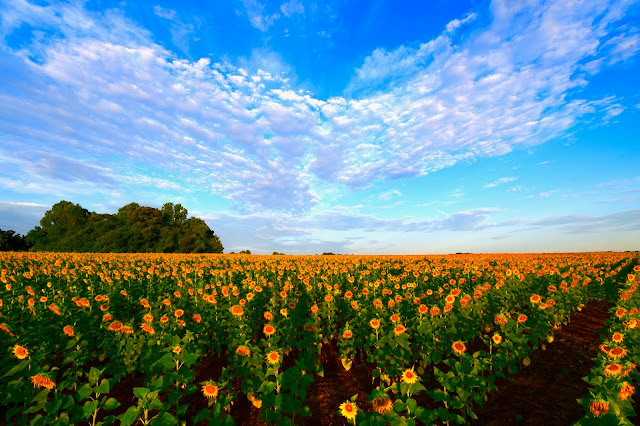Few things are as mesmerizing in summer as driving down a country road and suddenly discovering a vast landscape of sunflowers. In field after field of yellow, red, and green, capped by sweeping blue skies and dazzling clouds, one cannot avoid the welcome sense of being completely liberated — if only for a moment — from the burdens and distractions of the spinning world. As Willa Cather suggested in My Antonia, such experiences always leave us with the gentle assurance that we are on the right road, both literally and metaphorically:
The new country lay open before me: there were no fences in those days, and I could choose my own way over the grass uplands, trusting the pony to get me home again. Sometimes I followed the sunflower-bordered roads. Fuchs told me that the sunflowers were introduced into that country by the Mormons; that at the time of the persecution when they left Missouri and struck out into the wilderness to find a place where they could worship God in their own way, the members of the first exploring party, crossing the plains to Utah, scattered sunflower seeds as they went. The next summer, when the long trains of wagons came through with all the women and children, they had a sunflower trail to follow. I believe that botanists do not confirm Jake's story, but insist that the sunflower was native to those plains. Nevertheless, that legend has stuck in my mind, and sunflower-bordered roads always seem to me the roads to freedom."
From My Antonia
by
Willa Cather
Willa Cather
1873 - 1947


It's an appealing story though rather unlikely - those pioneering Mormons would have had to have left Missouri with an enormous supply of sunflower seed and I expect they had more pressing needs than planting flowers. However it's very difficult to feel down-hearted when confronted with a field full of sunflowers.
ReplyDeleteThanks for your comment, John. Yes, as Willa Cather herself admitted, botanists have not confirmed the story. It's a charming and uplifting story nonetheless. As people are fond of saying here in the American south, where I currently live, "one should never ruin a good story by slavish adherence to the facts."
DeleteI haven't planted any sunflowers this year but there's nothing quite like them. I like apocryphal stories that probably aren't true (like this Mormon story). I guess sunflowers were native to the area but perhaps they cultivated them and chose where to plant them?
ReplyDeleteGreat to hear from you, Dominic. We always make it a point to have a few sunflowers in our garden during the summer months, and they always seem to radiate hope. As for Willa Cather's story, I'm not too concerned with whether it's true or not. It may be apocryphal, but that does nothing to diminish its charm and optimism. To paraphrase Cather, sunflower-bordered roads may be roads to freedom from whatever weighs us down.
DeleteJoe would be so proud of you for this blog. So very well done George. Ann Sharp
ReplyDeleteSo good to hear from you, Ann, and I'm honored by your comment. I miss Joe's physical presence in the world, but, in so many important ways, he is still here. His paintings still pulse with life, his memories still bring great laughter, and I seldom give a thought to art or creativity without Joe being part of the conversation. I hope you are doing well, and that you will continue to stay in touch. Both Margaret and I send our love to you.
Delete